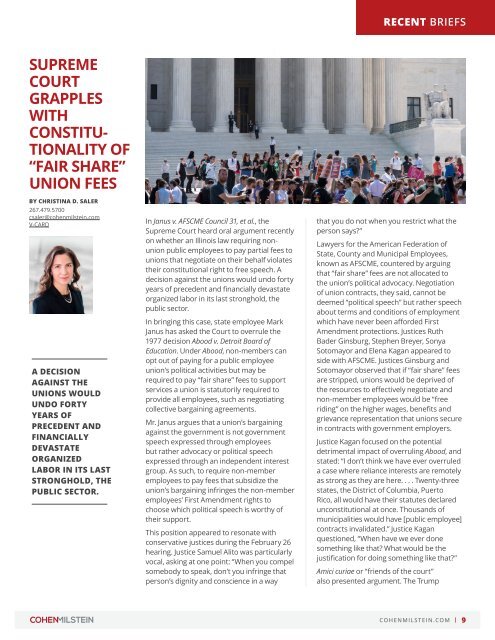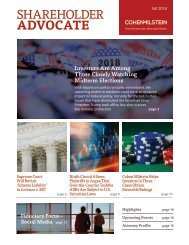Shareholder Advocate Spring 2018
You also want an ePaper? Increase the reach of your titles
YUMPU automatically turns print PDFs into web optimized ePapers that Google loves.
RECENT BRIEFS<br />
SUPREME<br />
COURT<br />
GRAPPLES<br />
WITH<br />
CONSTITU-<br />
TIONALITY OF<br />
“FAIR SHARE”<br />
UNION FEES<br />
BY CHRISTINA D. SALER<br />
267.479.5700<br />
csaler@cohenmilstein.com<br />
V-CARD<br />
A DECISION<br />
AGAINST THE<br />
UNIONS WOULD<br />
UNDO FORTY<br />
YEARS OF<br />
PRECEDENT AND<br />
FINANCIALLY<br />
DEVASTATE<br />
ORGANIZED<br />
LABOR IN ITS LAST<br />
STRONGHOLD, THE<br />
PUBLIC SECTOR.<br />
In Janus v. AFSCME Council 31, et al., the<br />
Supreme Court heard oral argument recently<br />
on whether an Illinois law requiring nonunion<br />
public employees to pay partial fees to<br />
unions that negotiate on their behalf violates<br />
their constitutional right to free speech. A<br />
decision against the unions would undo forty<br />
years of precedent and financially devastate<br />
organized labor in its last stronghold, the<br />
public sector.<br />
In bringing this case, state employee Mark<br />
Janus has asked the Court to overrule the<br />
1977 decision Abood v. Detroit Board of<br />
Education. Under Abood, non-members can<br />
opt out of paying for a public employee<br />
union’s political activities but may be<br />
required to pay “fair share” fees to support<br />
services a union is statutorily required to<br />
provide all employees, such as negotiating<br />
collective bargaining agreements.<br />
Mr. Janus argues that a union’s bargaining<br />
against the government is not government<br />
speech expressed through employees<br />
but rather advocacy or political speech<br />
expressed through an independent interest<br />
group. As such, to require non-member<br />
employees to pay fees that subsidize the<br />
union’s bargaining infringes the non-member<br />
employees’ First Amendment rights to<br />
choose which political speech is worthy of<br />
their support.<br />
This position appeared to resonate with<br />
conservative justices during the February 26<br />
hearing. Justice Samuel Alito was particularly<br />
vocal, asking at one point: “When you compel<br />
somebody to speak, don’t you infringe that<br />
person’s dignity and conscience in a way<br />
that you do not when you restrict what the<br />
person says?”<br />
Lawyers for the American Federation of<br />
State, County and Municipal Employees,<br />
known as AFSCME, countered by arguing<br />
that “fair share” fees are not allocated to<br />
the union’s political advocacy. Negotiation<br />
of union contracts, they said, cannot be<br />
deemed “political speech” but rather speech<br />
about terms and conditions of employment<br />
which have never been afforded First<br />
Amendment protections. Justices Ruth<br />
Bader Ginsburg, Stephen Breyer, Sonya<br />
Sotomayor and Elena Kagan appeared to<br />
side with AFSCME. Justices Ginsburg and<br />
Sotomayor observed that if “fair share” fees<br />
are stripped, unions would be deprived of<br />
the resources to effectively negotiate and<br />
non-member employees would be “free<br />
riding” on the higher wages, benefits and<br />
grievance representation that unions secure<br />
in contracts with government employers.<br />
Justice Kagan focused on the potential<br />
detrimental impact of overruling Abood, and<br />
stated: “I don’t think we have ever overruled<br />
a case where reliance interests are remotely<br />
as strong as they are here. . . . Twenty-three<br />
states, the District of Columbia, Puerto<br />
Rico, all would have their statutes declared<br />
unconstitutional at once. Thousands of<br />
municipalities would have [public employee]<br />
contracts invalidated.” Justice Kagan<br />
questioned, “When have we ever done<br />
something like that? What would be the<br />
justification for doing something like that?”<br />
Amici curiae or “friends of the court”<br />
also presented argument. The Trump<br />
COHENMILSTEIN.COM I 9



